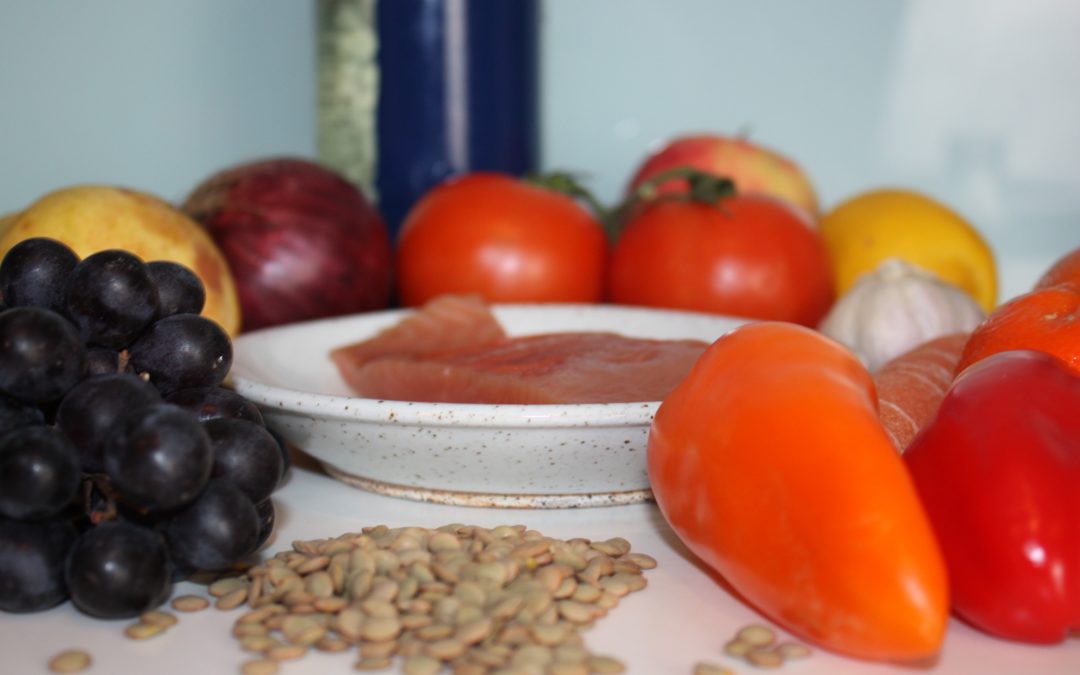It is well known that the Mediterranean diet is good for a healthy heart and there is much research to support this. In a study published in BMC MED researchers analyzed the diet of 23,902 adults in England and found that those whose diet was closest to a Mediterranean diet were significantly less likely to develop heart disease. Also, the traditional Mediterranean diet has been associated with a lower risk of blocked arteries. In fact in a randomized control trial the Mediterranean diet has been linked with improving High-Density Lipoprotein function, (HDL the good cholesterol), in high-cardiovascular-risk individuals.
What is the Mediterranean diet?
It is a traditional way of eating real whole foods that are found locally in the countries that surround the Mediterranean. But as you can see below these are foods that we get in our supermarkets, all over the world and can easily be included in our diet.
Some of the main aspects of the Mediterranean diet to include are:
- Plenty of fresh vegetables. You should ensure that you have these nutrient rich foods at both lunch and dinnertime. You can make simple salads using vegetables like tomatoes, peppers, carrots, leafy greens, etc. In the winter months if you prefer warmer foods you can roast or grill your vegetables, stir-fry them or have vegetable soups.
- Beans and legumes, which are a good source of protein and fiber. If you don’t have time to cook your beans you can get BPA-free canned beans and add these to your soups and salads. Also, have whole grains like oats, barley, brown rice and whole wheat and reduce your consumption of processed grains. The soluble dietary fiber in these foods has been shown to reduce lipid levels, blood pressure and inflammation and also legume consumption has been associated with a lower risk of cardio-vascular disease.
- Olive oil is the main oil used in the Mediterranean, it has antioxidants shown to have cardio protective effects and has been shown to decrease plasma LDL concentrations (the bad cholesterol) . Do use this to make your salad dressings.
- Seafood such such as salmon, tuna and sardines are a good source of Omega 3 fatty acids and fish intake has been associated with lower cardiovascular disease in Mediterranean population.
- Fresh fruit like oranges, apples, pomegranates, grapes, etc are eaten daily and you should have these instead of sugar-laden desserts.
The Mediterranean diet is based on having a healthy lifestyle; eating a variety of delicious foods, being active and enjoying quality time with family and friends. As you can see it is very easy to include many of these foods in our diet for a healthy heart. (This article was written for Triyoga
REFERENCES:
Prospective association of the Mediterranean diet with cardiovascular disease incidence and mortality and its population impact in a non-Mediterranean population: the EPIC-Norfolk study. Sep 29;14(1):135. Tong TY1, Wareham NJ1, Khaw KT2, Imamura F1, Forouhi NG3. BMC Med. 2016
Relationship between Mediterranean diet and asymptomatic peripheral arterial disease in a population of pre-menopausal women. Mattioli AV1, Coppi F2, Migaldi M3, Scicchitano P4, Ciccone MM4, Farinetti A5. Nutr Metab Cardiovasc Dis. 2017 Nov;27(11):985-990. doi: 10.1016/j.numecd.2017.09.011. Epub 2017 Oct 3.
Mediterranean Diet Improves High-Density Lipoprotein Function in High-Cardiovascular-Risk Individuals: A Randomized Controlled Trial. Hernáez Á1, Castañer O1, Elosua R1, Pintó X1, Estruch R1, Salas-Salvadó J1, Corella D1, Arós F1, Serra-Majem L1, Fiol M1, Ortega-Calvo M1, Ros E1, Martínez-González MÁ1, de la Torre R1, López-Sabater MC1, Fitó M2. Circulation. 2017 Feb 14;135(7):633-643. doi: 10.1161/CIRCULATIONAHA.116.023712.
Lipid Lowering with Soluble Dietary Fiber. Surampudi P1, Enkhmaa B1, Anuurad E1, Berglund L2,3. Curr Atheroscler Rep. 2016 Dec;18(12):75.
Legume consumption and CVD risk: a systematic review and meta-analysis. Marventano S1, Izquierdo Pulido M2, Sánchez-González C3, Godos J4, Speciani A5, Galvano F4, Grosso G6. Public Health Nutr. 2017 Feb;20(2):245-254. doi: 10.1017/S1368980016002299.
Antioxidant and anti-atherogenic activities of olive oil phenolics. Turner R1, Etienne N, Alonso MG, de Pascual-Teresa S, Minihane AM, Weinberg PD, Rimbach G. nt J Vitam Nutr Res. 2005 Jan;75(1):61-70.
Olive Oil Polyphenols Decrease LDL Concentrations and LDL Atherogenicity in Men in a Randomized Controlled Trial. Hernáez Á1, Remaley AT2, Farràs M3, Fernández-Castillejo S4, Subirana I5, Schröder H6, Fernández-Mampel M7, Muñoz-Aguayo D8, Sampson M2, Solà R9, Farré M10, de la Torre R11, López-Sabater MC12, Nyyssönen K13, Zunft HJ14, Covas MI8, Fitó M15. J Nutr. 2015 Aug;145(8):1692-7. doi: 10.3945/jn.115.211557. Epub 2015 Jul 1.
Fish intake is associated with lower cardiovascular risk in a Mediterranean population: Prospective results from the Moli-sani study. Bonaccio M1, Ruggiero E2, Di Castelnuovo A2, Costanzo S2, Persichillo M2, De Curtis A2, Cerletti C2, Donati MB2, de Gaetano G2, Iacoviello L3; Moli-sani study Investigators. Nutr Metab Cardiovasc Dis. 2017 Oct;27(10):865-873. doi: 10.1016/j.numecd.2017.08.004. Epub 2017 Aug 23.
